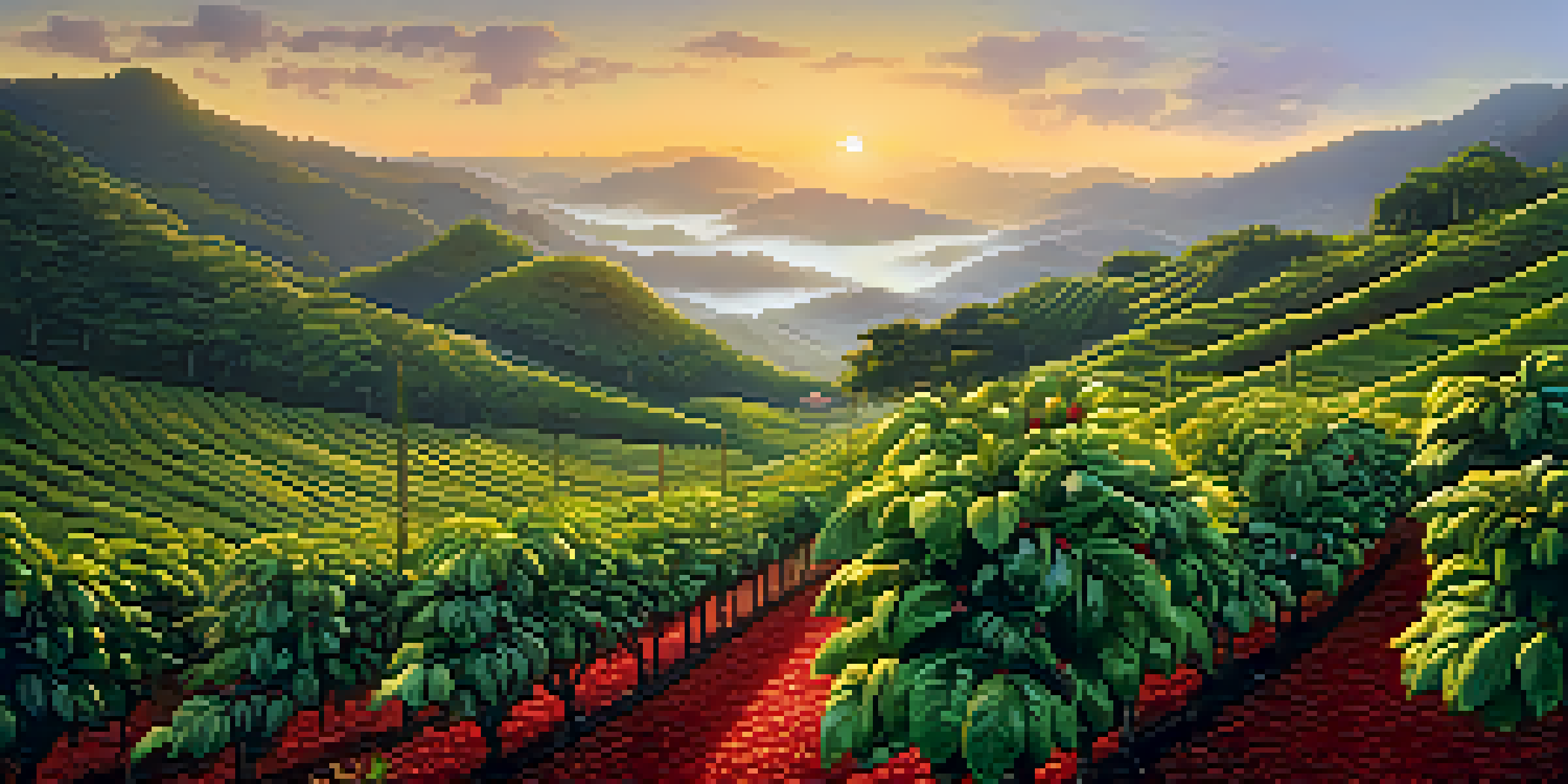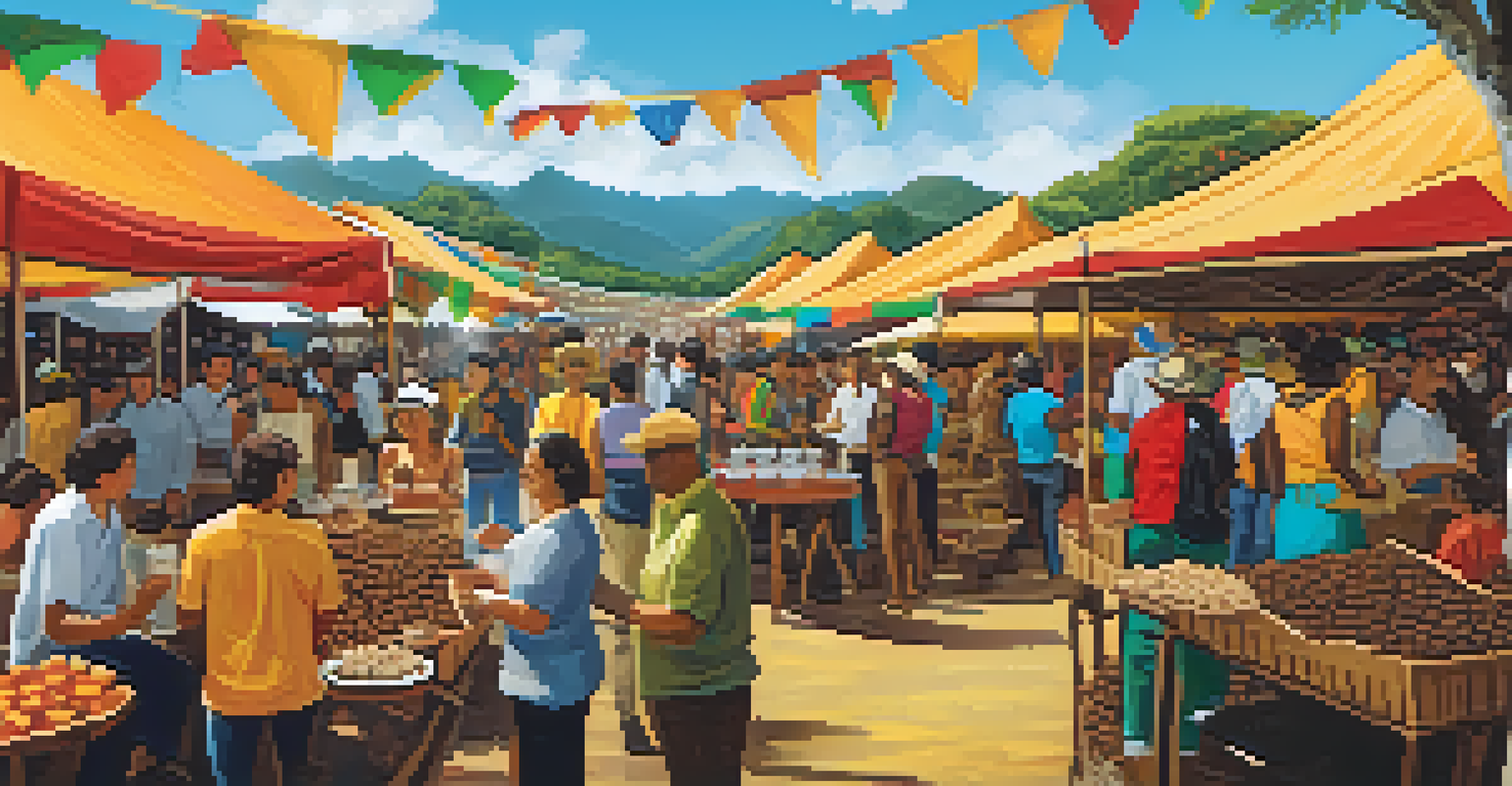Discovering Brazil's Rich Coffee Heritage and Plantations

The Origins of Coffee in Brazil: A Historical Overview
Brazil's coffee journey began in the early 18th century, introduced by Francisco de Melo Palheta. He smuggled coffee seeds from French Guiana, igniting a passion for coffee cultivation that would change the landscape of Brazilian agriculture.
Coffee is a language in itself.
By the 19th century, Brazil had become one of the largest coffee producers in the world, thanks to its ideal climate and rich soil. The vast plantations spread across the country, particularly in regions like Minas Gerais and São Paulo, became synonymous with Brazilian coffee.
This historical foundation set the stage for Brazil to develop a unique coffee culture, blending local traditions with European influences that still resonate today.
Brazilian Coffee Varieties: A Flavorful Diversity
Brazil is home to several coffee varieties, each offering distinct flavors and aromas. Arabica is the most prevalent, known for its smooth, sweet taste, while Robusta is prized for its bold, earthy profile.

The diversity in coffee cultivation reflects the country's varied ecosystems. From the mountainous terrains of Minas Gerais to the fertile valleys of Espírito Santo, each region produces coffee with unique characteristics shaped by local climate and soil.
Brazil's Coffee Roots and Growth
Brazil's coffee journey began in the 18th century and quickly established the country as a leading coffee producer.
This rich variety not only captivates coffee enthusiasts but also plays a crucial role in Brazil's economy, as different types cater to various global markets and consumer preferences.
Visiting Coffee Plantations: An Immersive Experience
Touring Brazil's coffee plantations offers a firsthand look at the coffee-making process, from bean to cup. Visitors can engage in activities like picking coffee cherries, which gives them a deeper appreciation for the labor and love behind each brew.
The smell of good coffee is one of the greatest inventions.
Many plantations provide guided tours that delve into the history and techniques of coffee cultivation, often accompanied by tastings of freshly brewed coffee. These experiences not only educate but also create lasting memories for coffee lovers.
It's an opportunity to connect with local farmers, hear their stories, and understand the cultural significance of coffee in Brazilian society, enriching the overall experience.
The Role of Sustainability in Coffee Production
Sustainability has become a cornerstone of Brazilian coffee production, with many farmers adopting eco-friendly practices. This includes shade-grown coffee, which preserves the surrounding ecosystems and enhances biodiversity.
Moreover, initiatives such as fair trade and organic certifications are gaining traction, ensuring that farmers receive fair compensation and that consumers enjoy high-quality coffee without harming the environment.
Diverse Coffee Varieties Abound
Brazil boasts several coffee varieties, with distinct flavors influenced by its diverse ecosystems.
By prioritizing sustainability, Brazil not only secures its coffee heritage but also sets a positive example for the global coffee community.
The Cultural Significance of Coffee in Brazil
Coffee in Brazil is more than just a beverage; it's a cultural phenomenon. From casual conversations in the morning to social gatherings in the afternoon, coffee plays a pivotal role in daily life.
The traditional 'café com leite' is a cherished part of Brazilian breakfasts, while coffee shops often serve as meeting points for friends and family. This social aspect highlights the community spirit that coffee fosters.
In many ways, coffee acts as a bridge connecting generations, with family recipes and brewing methods being passed down, preserving a rich cultural tradition.
Brazilian Coffee Festivals: Celebrating Tradition and Flavor
Brazil hosts vibrant coffee festivals throughout the year, celebrating its rich coffee heritage. These events feature tastings, workshops, and competitions that showcase the best of Brazilian coffee.
One notable festival is the 'Café com Letras' in Minas Gerais, where visitors can immerse themselves in coffee culture while enjoying local music and art. Such events promote community engagement and highlight the importance of coffee in Brazilian identity.
Cultural Impact of Coffee in Brazil
Coffee is a vital part of Brazilian culture, fostering community and connections through shared experiences.
Attending these festivals not only offers a chance to savor exceptional coffee but also to appreciate the traditions and innovations that keep Brazil at the forefront of the coffee world.
The Future of Brazilian Coffee: Trends and Innovations
As the coffee industry evolves, Brazil is embracing trends that focus on quality and sustainability. Innovations in processing and roasting techniques are enhancing flavor profiles, appealing to a global audience.
Additionally, the rise of specialty coffee shops is changing the way Brazilians consume coffee, with a growing interest in single-origin brews and artisanal methods. This shift reflects a broader appreciation for high-quality coffee experiences.

Looking ahead, Brazil's commitment to sustainability and quality will be crucial in maintaining its status as a leading coffee producer while catering to the ever-changing tastes of coffee lovers worldwide.